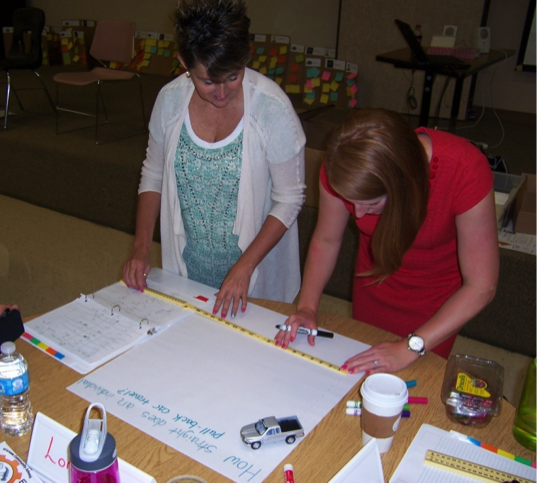Back to School Means Back to STEM
The Next Generation Science Standards (http://www.nextgenscience.org/next-generation-science-standards) identifies eight practices of science and engineering as essential for all students to learn. These are:
- Asking questions (for science) and defining problems (for engineering)
- Developing and using models
- Planning and carrying out investigations
- Analyzing and interpreting data
- Using mathematics and computational thinking
- Constructing explanations (for science) and designing solutions (for engineering)
- Engaging in argument from evidence
- Obtaining, evaluating, and communicating information
One of the best ways to implement all of these practices is through the growing practice of Project Based Learning (PBL), defined by Edutopia as "a dynamic classroom approach in which students actively explore real-world problems and challenges and acquire a deeper knowledge" (http://www.edutopia.org/project-based-learning). The duration of these projects can be as short as a single class period or last throughout an entire school year, but typically last from 1-3 weeks.
Featured Products
This past summer, Grade 6 – 9 science teachers, math teachers, and administrators from Warsaw (IN) Community Schools partnered with science and math educators from Ball State University during a two week summer institute to design classroom projects, strengthen science and math content knowledge, and refine inquiry practices. The Arbor Scientific "Pull-Back Car" was featured in a "mini" PBL activity to illustrate how science, technology, engineering, and mathematics (STEM) can be integrated into an authentic data collection and analysis activity.
Participants were divided into 12 groups and each group of 4-5 participants was given a pull-back car. Each participant played the role of a quality control engineer, whose job description may include taking "part in the design and evaluation of the product" and being "responsible for making sure that the materials meet the requisite standards and that the equipment works correctly" (http://www.wisegeek.com/what-is-a-quality-control-engineer.htm). Each group served as a team of quality control engineers who were instructed to design and conduct tests on these cars to determine if Arbor Scientific should continue selling them.
Groups scattered in and around the building to design and conduct their trials.
The engineering teams addressed four questions about the cars:
- How consistent is the distance an individual pull-back car travels after being pulled back a specified distance?
- How consistent is the amount of time an individual pull-back car travels after being pulled back a specified distance?
- How straight does an individual pull-back car travel?
- Do all pull-back cars behave similarly?
Each team was charged with designing an experiment to answer their quality question, conducting the trials, analyzing their results, summarizing their findings on poster paper, and reporting their results to the large group.
After completing the data collection portion of the activity, groups returned to their tables to analyze their data and report their results.
After each group had completed their tasks, each group presented their findings.
Once the participants had a good idea of how consistent the cars were, these cars were again used later in the summer institute to investigate additional inquiry questions, such as:
- How does the distance the car is pulled back before release affect the total distance it travels?
- How does the distance the car is pulled back before release affect the total time it travels?
- How does additional weight affect the distance the car travels when pulled back a specified distance?
- How does additional weight affect the total time the car travels when pulled back a specified distance?
- How does the angle of incline affect the distance the car travels when pulled back a specified distance?
- How does the angle of incline affect the total time the car travels when pulled back a specified distance?
Despite slight inconsistencies in the behaviors of the cars, participants in this summer institute agreed that the Arbor Scientific Pull-Back Car is an excellent inexpensive product that can be used in many different investigations – especially when one wants to integrate aspects of STEM. These cars can be used at any grade level and provide countless opportunities for students to engage in authentic scientific inquiry. They also provide an inexpensive way for math teachers to incorporate real world data measurement and analysis. As a science educator, I heartily recommend this product and can honestly say that I consider it the ultimate inquiry device!
Dr. Joel Bryan
Ball State University
Muncie, Indiana
Dr. Bryan teaches at Ball State for the Department of Physics and Astronomy. He taught all levels of high school physics (Pre-AP, AP, conceptual) and a variety of mathematics courses for 13 years before receiving his Ph.D. in curriculum and instruction at Texas A&M University.


